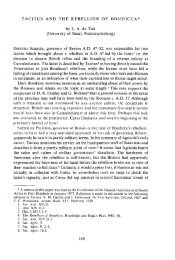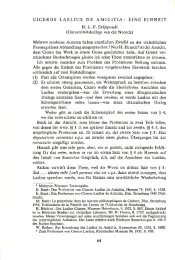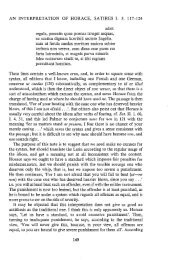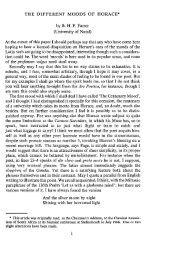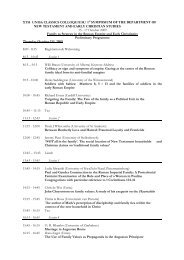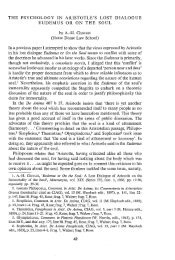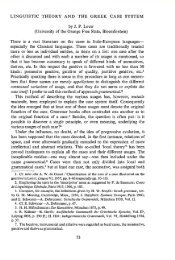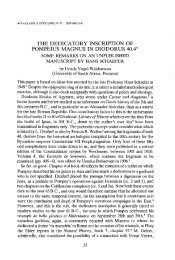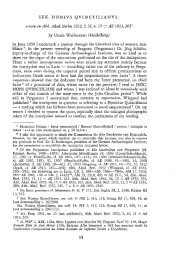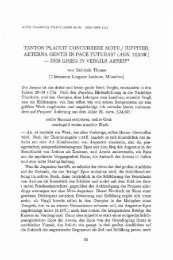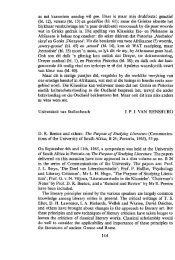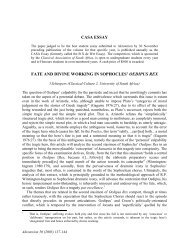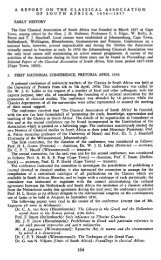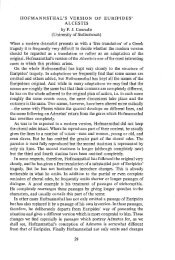Donatella du Plessis - Classical Association of South Africa
Donatella du Plessis - Classical Association of South Africa
Donatella du Plessis - Classical Association of South Africa
You also want an ePaper? Increase the reach of your titles
YUMPU automatically turns print PDFs into web optimized ePapers that Google loves.
CASA ESSAY<br />
The paper judged to be the best student essay submitted to Akroterion by<br />
November 30, preceding publication <strong>of</strong> the volume for that specific year, is<br />
published annually as the CASA / KVSA Essay. The competition, which is<br />
sponsored by the <strong>Classical</strong> <strong>Association</strong> <strong>of</strong> <strong>South</strong> <strong>Africa</strong>, is open to undergra<strong>du</strong>ate<br />
students every year and to Honours students in even-numbered years.<br />
The winner receives a cash prize <strong>of</strong> R500.<br />
A COMPARATIVE STUDY OF THE DIDO - AENEAS EPISODE IN<br />
VIRGIL’S AENEID AND CHRISTOPHER MARLOWE’S<br />
DIDO, QUEENE OF CARTHAGE<br />
<strong>Donatella</strong> <strong>du</strong> <strong>Plessis</strong>, <strong>Classical</strong> Civilzation III (University <strong>of</strong> KwaZulu-Natal)<br />
The Dido-Aeneas episode in Virgil’s Aeneid is one <strong>of</strong> the most celebrated stories ever<br />
written. It has inspired countless artists in the fields <strong>of</strong> art, music and <strong>of</strong> course,<br />
literature. Christopher Marlowe’s Dido, Queene <strong>of</strong> Carthage is an obscure, early<br />
work that no one seems to pay much attention to except Marlowe scholars, who<br />
prefer to occasionally study what makes Marlowe’s first attempt at writing for the<br />
stage a very bad play, a reputation it thoroughly deserves.<br />
It is strange, however, that Marlowe, the genius responsible for The Tragical<br />
History <strong>of</strong> Doctor Faustus and Tamberlaine, could have pro<strong>du</strong>ced something that is<br />
considered on the one hand bad and on the other an adaptation <strong>of</strong> Virgil, whose work<br />
has commanded nothing but the highest respect since ancient times. While Virgil was<br />
undoubtedly Marlowe’s primary source, 1 one should keep in mind that Virgil and<br />
Marlowe wrote for different reasons. Many <strong>of</strong> Virgil’s intentions were political.<br />
Virgil glorified the politics <strong>of</strong> Augustus and encouraged the Roman people to take<br />
pride in their roots. Marlowe wrote this play at university and his audience would<br />
have been students who knew Virgil well. In transforming Aeneas into an obtuse,<br />
pathetic kind <strong>of</strong> “pet” <strong>of</strong> a domineering and oddly masculine Dido, Marlowe strips the<br />
story <strong>of</strong> nobility and adds a prominent ridiculous and comic element that strongly<br />
suggests that he is parodying rather than re-writing Virgil for the amusement <strong>of</strong> his<br />
fellow students. It should also be mentioned that Marlowe’s play was premiered by a<br />
children’s company, 2 and the notion <strong>of</strong> a little boy Dido pleading with a little boy<br />
Aeneas, 3 on top <strong>of</strong> Marlowe’s comic script must have made for hilarious viewing.<br />
Dido in the Aeneid is a fascinating character, a wise and respectable ruler <strong>of</strong> a<br />
great civilization. 4 She is also sympathetic, three-dimensional and deeply human, the<br />
victim <strong>of</strong> forces beyond her control; in stark contrast to a rather uninteresting, overly<br />
1<br />
2<br />
3<br />
4<br />
Although Marlowe follows Virgil in this play, stronger emphasis on the character <strong>of</strong> Dido is<br />
derived from Ovid’s Heroides. Cf. Cheney 1997:9 for Ovid’s substantial influence on Marlowe’s<br />
work.<br />
The Children <strong>of</strong> Her Majesty’s Chapel at Blackfriars.<br />
Female roles were always played by boys in Elizabethan times.<br />
See the bull’s hide incident (Aen. 1.367 – 368), the greatness <strong>of</strong> Carthage as a city (1.455) and<br />
Dido described as a great lawmaker (1.507 – 508).<br />
Akroterion 53 (2008) 111-119
112 CASA ESSAY<br />
sensitive Aeneas whose great destiny to found Rome does not save him from a<br />
negative reaction from the reader when he leaves Dido to pursue his destiny. 5<br />
When Book 4 opens, Dido can “get no peace from love’s disquiet” (Aen. 4.5).<br />
She acknowledges her feelings to Anna, but is reluctant to act upon them, out <strong>of</strong><br />
respect for Sychaeus (4.15 – 16) and the gods (4.25 – 27). 6 Despite multiple sacrifices<br />
divine approval is refused, and Dido’s indecision eventually brings the construction<br />
<strong>of</strong> the city to a halt, 7 her degradation intensifying to the extent that it transcends the<br />
personal into the political (Quinn 1965:19). Soon hereafter the cave scene is depicted,<br />
which Virgil aptly describes as follows:<br />
That day was doom’s first birthday and that first day was the cause <strong>of</strong><br />
Evils: Dido reckoned nothing for appearance or reputation:<br />
The love she had brooded on now has a secret love no longer;<br />
Marriage she called it, drawing the word to veil her sin (Aen. 4.169 – 172).<br />
Dido’s calling this incident a marriage represents “one more step from reality<br />
into self-deception” (Quinn 1965:20), and embodies Dido’s unstable state <strong>of</strong> mind in<br />
the rest <strong>of</strong> the book. When Aeneas decides to leave, Dido is described as “raving /<br />
Like some Bacchante driven wild” (Aen. 4.300 – 301). She calls Aeneas “unfaithful”<br />
and “heartless”; she blames him for the loss <strong>of</strong> her reputation (4.320 – 323) and<br />
scorns his protests that he leaves by the god’s will and not his own (4.379 – 380). 8<br />
The reader’s sympathy is once again evoked when Dido at last realizes that Aeneas<br />
will not stay with her and she then decides to die:<br />
Hapless Dido, frightened out <strong>of</strong> her wits by her destiny<br />
Prayed for death: she would gaze no more on the dome <strong>of</strong> daylight<br />
(Aen. 4.451 – 45).<br />
The reader is both fearful and oddly respectful as the deathly calm with which she<br />
systematically organizes her own suicide once again turns to anger, her cursing <strong>of</strong><br />
Aeneas and all that he has done culminating in the curse <strong>of</strong> Hannibal before she<br />
mounts the pyre and kills herself. 9<br />
5<br />
6<br />
7<br />
8<br />
9<br />
It has <strong>of</strong>ten been suggested that this attitude towards Aeneas is only held by modern readers<br />
because “we are post-Romantics”, cf. McLeish 1972:127. There is strong evidence, however, that<br />
ancient readers felt exactly the same sympathy for Dido, for example Ovid’s Heroides contains<br />
the first reference to Dido after Virgil and tells the story from Dido’s perspective (an idea<br />
Marlowe has used in this play too). Ovid would never have done this were it considered<br />
inappropriate, cf. Farron 1980:43.<br />
This also presents Dido as fulfilling the Roman ideal <strong>of</strong> being an univira, a woman with only one<br />
husband, a status immensely difficult to achieve considering the frequency <strong>of</strong> divorce in Roman<br />
society.<br />
According to Edgeworth, Dido is a symbol <strong>of</strong> Carthage itself and the city also suffers with her,<br />
this scene foreshadowing her death (1976: 130).<br />
This is also the first incidence where Dido’s passion and Aeneas’ piety clash openly, an<br />
immensely important theme in this book.<br />
Edgeworth 1976:132 believes that the accusations Dido levels against Aeneas, as well as her<br />
method <strong>of</strong> suicide (stabbing herself, then mounting the pyre) may reflect the suicide <strong>of</strong><br />
Hastrubal’s wife after his surrender to Scipio.
A COMPARATIVE STUDY OF THE DIDO – AENEAS EPISODE 113<br />
In Marlowe, the Dido-Aeneas relationship is subject to a doubling device<br />
which Kinney (2000:267) calls the “Ganymede script”. This device is intro<strong>du</strong>ced in<br />
the first scene, which begins “rather shockingly” (Godshalk 1971:2) with “Jupiter<br />
dandling Ganimed upon his knee”, “pulling feathers out <strong>of</strong> Mercury’s<br />
wing ... <strong>of</strong>fering these and other presents in return for love and defying Juno to spoil<br />
his fun”. 10 We thus know immediately that this is no conventional interpretation <strong>of</strong><br />
Virgil (Waith 1965: 233). The portrayal <strong>of</strong> Jupiter as a perverse old man risking all to<br />
please a little boy he is infatuated with, intro<strong>du</strong>ces the theme <strong>of</strong> unnatural and<br />
destructive love (Godshalk 1971:3).<br />
Homosexual love is a constant undercurrent in this play, which features an<br />
oddly masculine, powerful Dido courting a boyish, effeminate Aeneas. 11 As Kinney<br />
(2000:265) observes, “if the names <strong>of</strong> the characters were removed from Marlowe’s<br />
text, one might have difficulty distinguishing the sex <strong>of</strong> its speakers”. Marlowe’s<br />
Dido does not behave like a conventional romantic heroine at all, her style <strong>of</strong> speech<br />
in particular shows no trace <strong>of</strong> orthodox femininity (Kinney 2000:265). Her first line<br />
in the play reproaches Aeneas:<br />
What stranger art thou that doest eye me thus? (2.1.74)<br />
When Aeneas thanks Dido for her kindness to Ascanius, she replies:<br />
Remember who thou art, speake like thy selfe,<br />
Humilitie belongs to common groomes (2.1.100 – 101)<br />
Her reaction to Aeneas’ relation <strong>of</strong> Troy’s fall is also strangely erratic. First,<br />
she seems to be calling him a coward:<br />
What, faints Aeneas to remember Troy?<br />
In whose defence he fought so valiantly (2.1.118 – 119)<br />
When Aeneas emotively relates the murder <strong>of</strong> Priam, she cries out:<br />
O end Aeneas, I can heare no more (2.1.243)<br />
At the narrative’s conclusion, however, she shows no signs <strong>of</strong> Virgilian<br />
Dido’s desire to hear the story repeated and falls back into the callousness that began<br />
the scene:<br />
Troian, thy ruthfull tale hath made me sad:<br />
Come let us thinke upon some pleasing sport,<br />
To rid me from these melancholly thoughts (2.1.301 – 303)<br />
This overly frank and flippant mode <strong>of</strong> expression is shockingly unlike<br />
Virgil’s dignified queen, who not only gains the immediate respect <strong>of</strong> the reader, but<br />
is not portrayed as being at all forceful or insensitive in her inquiries. One cannot help<br />
feeling disbelief at the prospect <strong>of</strong> a genius like Marlowe initiating this kind <strong>of</strong><br />
character change out <strong>of</strong> mere ineptitude. This is the first indication <strong>of</strong> Marlowe’s<br />
intention to transform Virgil’s tragedy into a comedy.<br />
10<br />
11<br />
Dido, Queene <strong>of</strong> Carthage 1.1 stage directions.<br />
The play being performed by children reinforces this, as children’s companies were irrevocably<br />
connected with homosexual desire in the Elizabethan mind. Cf. Kinney 2000:271.
114 CASA ESSAY<br />
This becomes more evident when contrasting the way Virgil and Marlowe<br />
portray Aeneas himself. Virgil does not portray Aeneas’ treatment <strong>of</strong> Dido or his<br />
behaviour in general in a particularly good light. 12 While Aeneas is an exemplary<br />
leader when it comes to his crew, 13 he is not the traditional epic hero: annoyingly<br />
sensitive and rather prone to lamentations. 14 The first time we see him, in the storm<br />
scene in Book 1, he is petrified:<br />
A mortal chill went through Aeneas and sapped him;<br />
he groaned (Aen. 1.91 – 92).<br />
As Fuhrer (1989:66) points out:<br />
Throughout Book 1 we see him sighing, crying or being frightened which<br />
suggests a rather unhardened state <strong>of</strong> mind and a rather emotional character.<br />
Furthermore, Aeneas is depicted in fear or sadness twice in book two, five<br />
times in book three [and] twice in book four.<br />
Furthermore, Aeneas’ already - minimal interest in his great destiny as the<br />
founder <strong>of</strong> Rome (Farron 1980:37) is forgotten completely after the cave scene. Virgil<br />
describes both him and Dido as “forgetting their kingdoms, rapt in a trance <strong>of</strong> lust”<br />
(Aen. 4.194). Once Mercury is sent to demand his immediate departure, however,<br />
Aeneas is unwilling to leave, but is so horrified at the gods’ displeasure that he cannot<br />
get away fast enough:<br />
Dazed indeed by that vision was Aeneas, and <strong>du</strong>mbfounded:<br />
His hair stood on end with terror, the voice stuck in his throat<br />
Awed by this admonition from the great throne above<br />
He desired to fly the country, dear though it was to him (Aen. 4.278 – 282).<br />
In the ensuing quarrel with Dido, Aeneas is almost torn apart by the<br />
conflicting emotions <strong>of</strong> passion and piety within him, but we are left in no doubt as to<br />
which he will choose. He also seems callously insensitive to Dido, declaring that:<br />
I [did not] <strong>of</strong>fer you marriage<br />
At any time or consent to be bound by a marriage contract (4.338 – 339). 15<br />
Furthermore, even though “God-fearing Aeneas ... longed to soothe her<br />
anguish with consolation” (Aen. 4.493), it is clear that Aeneas puts the gods’ wishes<br />
first:<br />
No more reproaches, then – they only torture us both.<br />
God’s will, not mine, says “Italy” (Aen. 4. 360 – 361).<br />
12<br />
13<br />
14<br />
15<br />
See Farron 1980.<br />
When they shipwreck at Carthage, Aeneas kills stags for his men, consoles them, and masks his<br />
own fear, Aen. 1.194.<br />
i.e. in Aeneid Books 1 to 4.<br />
Virgil has made it perfectly plain that Dido, by calling the relationship a marriage, is delusional<br />
(Quinn 1965:20). Aeneas only corrects her here when this definition is inconvenient for him.
A COMPARATIVE STUDY OF THE DIDO – AENEAS EPISODE 115<br />
The strength <strong>of</strong> Aeneas’ pietas is indicated in his expectation that Dido has to be<br />
content with his tossing their love aside in this manner. It is interesting, however, that<br />
Aeneas does not contradict Dido’s subsequent scorning <strong>of</strong> the gods, which suggests<br />
that while he may resent the gods’ decision, his pietas prevents him from scorning or<br />
disobeying them. By the time Dido sends Anna to plead with him on her behalf, he<br />
has become<br />
adamant against all pleading / Fate blocked them, heaven stopped his ears<br />
lest he turn complaisant (Aen. 4.439 – 440). 16<br />
Aeneas’ behaviour here provides an ideal opportunity for parody if Marlowe’s<br />
intentions were to parody Virgil’s tragedy. Marlowe’s near-complete deletion <strong>of</strong> the<br />
importance <strong>of</strong> Aeneas’ destiny creates a rather obtuse character that seems hopelessly<br />
unsuited for everything that befalls him, thus making him much funnier for the<br />
audience. The cave scene is an ideal example.<br />
Virgil places this scene amidst much thunder and lightning symbolically<br />
forecasting the destruction that will ensue. Marlowe’s storm serves no symbolic<br />
function whatsoever and merely “[provides] the opportunity for a<strong>du</strong>ltery” (Gill<br />
1977:148). Marlowe also inserts an interesting comic love scene just before they enter<br />
the cave, where he “fills in the Virgilian blanks and <strong>of</strong>fers a mimesis <strong>of</strong> two speaking<br />
subjects, negotiating their physical union” (Kinney 2000:264).<br />
Here, Dido expresses her feelings in a manner that can hardly be called subtle,<br />
agonizing over<br />
The thing that I will dye before I aske<br />
And yet desire to have before I dye. Aeneas (3.4.9 – 10)<br />
Aeneas obtusely replies:<br />
What ailes my Queene, is she falne sicke <strong>of</strong> late? (3.4.24)<br />
When he eventually realizes what she means, he insists that he is unworthy <strong>of</strong><br />
Dido’s love (3.4.33 – 34), but changes his mind seconds later, swearing “Never to<br />
like or love any but her” (3.4.50). As Kinney (2000:266) observes, Aeneas “moves<br />
from complete self-depreciation to apparently complete self-commitment in a kind <strong>of</strong><br />
performative parataxis”, which may easily be construed as being deliberately comical<br />
or parodying Virgilian Aeneas’ inclination to move from one extreme to the other,<br />
just in reverse. 17<br />
Dido then showers him with gifts and seems to transform him into a<br />
“cardboard cutout” <strong>of</strong> Sychaeus, 18 attempting to re-write his destiny as King <strong>of</strong><br />
Carthage rather than founder <strong>of</strong> Rome:<br />
16<br />
17<br />
18<br />
This represents the complete triumph <strong>of</strong> Aeneas’ piety over his passion.<br />
i.e. from complete self-commitment in his relationship with Dido to complete self-depreciation<br />
after the appearance <strong>of</strong> Mercury.<br />
This comparison with Sychaeus occurs many times, indeed, Dido seems to be attempting to turn<br />
Aeneas into Sychaeus from the first time she sees him: Warlike Aeneas, and in these base robes?<br />
/ Goe fetch the garment which Sichaeus ware (2.1.79 – 80).
116 CASA ESSAY<br />
Sichaeus, not Aeneas be thou calde:<br />
The King <strong>of</strong> Carthage, not Anchises sonne:<br />
Hold, take these Jewels at thy Lover’s hand,<br />
These golden bracelets, and this wedding ring,<br />
Wherewith my husband woo’d me yet a maide (3.4.59 – 63)<br />
As Gill (1977:151) points out:<br />
[Aeneas] never achieves a heroic status and consequently remains a puppet for<br />
the gods, temporarily a prisoner or pet for Dido to show <strong>of</strong>f to her people ... and<br />
finally, by no choice <strong>of</strong> his own, a caddish traitor to her love.<br />
She further suggests that this diminishment <strong>of</strong> Aeneas could very well come from<br />
Virgil himself, with one notable difference: Virgil has eight books left to save his<br />
hero’s reputation. Marlowe has little choice but to diminish Aeneas further, clearly<br />
casting Dido as the play’s heroine (Gill 1977:152). The “Ganymede Script” also<br />
comes into play here as Jupiter’s unnatural love for Ganymede is paralleled in Dido’s<br />
unnatural love for Aeneas. Both Jupiter and Dido assume the role <strong>of</strong> “masculine<br />
sonneteer” (Kinney 2000:265), wooing the effeminate boy. 19<br />
Dido’s relentless attempts to keep Aeneas in Carthage repeatedly suggest<br />
Marlowe’s comic intentions, for example, the two scenes where Aeneas attempts to<br />
leave (4.3,4 and 5.1), which are clearly meant to salvage Dido’s reputation but fail<br />
somewhat for two reasons. Firstly, there is far too much comedy in these scenes to be<br />
taken seriously. Secondly, Marlowe betrays a blatant desire to get things over with,<br />
ripping through the scenes leading up to Dido’s suicide at the risk <strong>of</strong> compromising<br />
their already-precarious tragic and dramatic value.<br />
Aeneas cuts a pitiful figure in these two scenes. Mercury’s order to leave is<br />
mitigated in a short soliloquy, where Aeneas once again demonstrates his inability to<br />
stick to one resolve:<br />
Jove wils it so, my mother wils it so:<br />
Let my Phenissa graunt, and then I goe:<br />
Graunt she or no, Aeneas must away (4.3.5 – 7)<br />
In this respect, Virgil’s Aeneas is entirely unlike Marlowe’s: when Aeneas is<br />
commanded to go, he obeys. Marlovian Aeneas seems to think he has some choice in<br />
the matter and waits for Dido’s approval, before contradicting himself and decides to<br />
leave with or without her approval, thus reinforcing Dido’s dominance in their<br />
relationship; Aeneas’ fear <strong>of</strong> her, and his awareness that he is her “prisoner”. 20 When<br />
Dido enters, Aeneas loses all ability to stand up for himself and allows Dido to<br />
bestow him crown and scepter (4.4.44 – 45). Thereupon Aeneas predictably gives<br />
19<br />
20<br />
As Kinney 2000:267 points out, “Godlike Dido, revisionary historian, seems to have acquired a<br />
Ganymede <strong>of</strong> her own”.<br />
This is reinforced by his subsequent instructions that his men be subtle in their preparation: Dido<br />
casts her eyes like anchors out, / To stay my Fleete from loosing forth the Bay<br />
(4.3.25 – 26).
A COMPARATIVE STUDY OF THE DIDO – AENEAS EPISODE 117<br />
way and promises to stay. 21 This scene suggests that Marlowe’s Aeneas is much less<br />
respectful <strong>of</strong> the gods than Virgil’s hero. When one considers the trouble that the king<br />
<strong>of</strong> the gods’ infatuation with Ganymede is causing, one can perhaps not blame<br />
Aeneas for this attitude. Nevertheless, his weakness is shameful, and his position as<br />
Dido’s “pet” is reinforced by his consent to be paraded “as Didos husband through<br />
the Punicke streets” (4.4.67). Dido further degrades herself by inventing a number <strong>of</strong><br />
ridiculous ways to keep Aeneas in Carthage:<br />
Goe, bid my Nurse take yong Ascanius,<br />
And beare him in the countrey to her house,<br />
Aeneas will not goe without his sonne:<br />
And lest he should ...<br />
Bring me his oares, his tackling and his sailes (4.4.105 – 109)<br />
While one might interpret these lines as the actions <strong>of</strong> a desperate woman in “a fit <strong>of</strong><br />
apprehension” (Godshalk 1971:2), Dido’s ridiculous last lines in the scene soundly<br />
disprove this:<br />
In steed <strong>of</strong> oares, let him use his hands,<br />
And swim to Italy (4.4.163 – 164)<br />
When we next see Aeneas, he is directing the construction <strong>of</strong> Carthage as if nothing<br />
has happened, even going so far as to welcome Mercury when he arrives a second<br />
time, demanding that Aeneas leave (5.1.53 – 54). Unlike in Virgil’s version, Aeneas<br />
does not leave out <strong>of</strong> piety, but because he discovers the substitution <strong>of</strong> Ascanius with<br />
Cupid (5.1.44 – 45). This provides him with a convenient excuse that absconds him<br />
from all blame. He then gathers tackling, oars and sails from Iarbas 22 and resolves to<br />
depart immediately, only to be drawn into a second confrontation with “a nearhysterical<br />
Dido, swiftly changing tactics to hold back a stolid, unimaginative Aeneas”<br />
(Gill 1977:153). Marlowe’s Aeneas en<strong>du</strong>res a similar, if not quite so poignantly<br />
portrayed dilemma to Virgil’s hero :<br />
O Queene <strong>of</strong> Carthage, wert thou ugly blacke,<br />
Aeneas could not choose but hold thee deare,<br />
Yet must he not gainsay the Gods behest (5.1.125 – 127)<br />
Dido ceases her usual manipulation and becomes more Virgilian, calling<br />
Aeneas a “Serpent that came creeping from the shoare” (5.1.165) and blames him for<br />
the destruction <strong>of</strong> her reputation. Marlowe even resorts to quoting the original Latin, 23<br />
which Gill (1977:153 – 154) thinks appropriate because “most <strong>of</strong> his audience ...<br />
would be familiar with Virgil’s lines ... which carry a richness <strong>of</strong> grief in their dignity<br />
that can hardly be repro<strong>du</strong>ced ... in English”. However, it is questionable whether<br />
21<br />
22<br />
23<br />
O Dido, patronesse <strong>of</strong> all our lives, / When I leave thee, death be my punishment (4.4.54 – 55).<br />
Marlowe has transformed Iarbas into a jealous suitor <strong>of</strong> Dido’s who is only too glad to see<br />
Aeneas leave.<br />
Dido: Si bene quid de te merui, fuit aut tibi quidquam / Dulce meum, miserere domus labentis: et<br />
istam / Oro, si quis adhuc precibus locus, exue mentem. Aeneas: Desine meque tuis incendere<br />
teque querelis, / Italiam non sponte sequor (5.1.136 – 140).
118 CASA ESSAY<br />
Marlowe would have wanted to repro<strong>du</strong>ce this effect when writing a comedy. It is<br />
more likely that these lines were included because a student audience would have<br />
been familiar with them, or because the presence <strong>of</strong> such dignified Latin here might<br />
even have heightened the comic effect.<br />
When Aeneas eventually leaves, the audience is expected to show a similar<br />
response to Marlowe’s Dido as to Virgil’s heroine. However, in act 5.1.277, just after<br />
Dido orders the construction <strong>of</strong> the pyre, it appears as though Marlowe may have lost<br />
interest and wanted the play to end. This period before Dido’s death is masterfully<br />
written by Virgil in a style resembling slow motion. In Marlowe, Dido decides to die,<br />
she discerns how and when to do so, and delivers her death speech and curse all in the<br />
space <strong>of</strong> a page! Her speech is laced with melodrama (Gill 1977:153):<br />
Here lye the Sword that in the darksome Cave<br />
He drew, and swore by to be true to me,<br />
Thou shalt burn first, thy crime is worse then his (5.1.295 – 297)<br />
This looks petty and ridiculous compared to the dignity <strong>of</strong> Virgil’s lines:<br />
O relics <strong>of</strong> him, things dear to me while fate, while heaven allowed<br />
It receive this life <strong>of</strong> mine, release me from my troubles!<br />
I have lived, I have run to the finish the course which fortune gave me:<br />
And now, a queenly shade, I shall pass to the world below<br />
(Aen. 4.651 – 654).<br />
As if her speech were not threat enough to Dido’s dying a graceful death,<br />
Marlowe then races through the subsequent suicides <strong>of</strong> Iarbas and Anna in the space<br />
<strong>of</strong> fifteen lines (Gill 1977:42), completely destroying any semblance <strong>of</strong> dignity in the<br />
scene. But is this deliberate? The rapidity <strong>of</strong> these events could suggest that Marlowe<br />
is becoming bored and inept. If we consider Marlowe’s intentions to be comic, it does<br />
not seem unlikely that he wanted to make his audience laugh rather than write a bad<br />
tragic scene.<br />
If one looks at this play in the context <strong>of</strong> it being watched by students, the<br />
notion <strong>of</strong> Marlowe intending to parody Virgil and make his fellow students laugh at<br />
what they had previously been forced to take seriously makes far more sense than him<br />
writing a dreadful tragedy with serious intentions. Furthermore, Marlowe’s<br />
characterization <strong>of</strong> Dido differs considerably from that <strong>of</strong> the Aeneid and it is worth<br />
considering whether Marlowe would have made such a change if his intention were<br />
simply to adapt Virgil. Marlowe had the chance to write a great tragedy. Instead, the<br />
entire story is overwhelmed with comic scenes featuring a domineering and erratic<br />
Dido and a <strong>du</strong>ll, pathetic Aeneas. The performance <strong>of</strong> this play by child actors, what<br />
Kinney (2000:270) calls “a troupe <strong>of</strong> Ganymedes”, would no doubt have added to the<br />
ridiculous element. It is highly unlikely that anyone with the slightest respect for<br />
Virgil (or with half <strong>of</strong> Marlowe’s genius), would have written an adaptation so<br />
steeped in the ridiculous with serious intentions, and it is for this reason that Marlowe<br />
may be construed as parodying Virgil rather than imitating him.
A COMPARATIVE STUDY OF THE DIDO – AENEAS EPISODE 119<br />
BIBLIOGRAPHY<br />
Cheney, P 1997. Marlowe’s counterfeit pr<strong>of</strong>ession: Ovid, Spenser,<br />
counter-nationhood. Toronto: University <strong>of</strong> Toronto Press.<br />
Day Lewis, C 1952. Trans. The Aeneid <strong>of</strong> Virgil. London: Hogarth Press.<br />
Edgeworth, R J 1976. The Death <strong>of</strong> Dido. The <strong>Classical</strong> Journal 72 (2):129 – 133.<br />
Farron, S 1980. The Dido-Aeneas episode as an attack on Aeneas’ mission and Rome.<br />
Greece & Rome 27 (1):34 – 47.<br />
Fuhrer, T 1989. Aeneas: A Study in Character Development. Greece & Rome<br />
36 (1):63 – 72.<br />
Gill, R 1977. Marlowe’s Virgil: Dido, Queene <strong>of</strong> Carthage. The Review <strong>of</strong> English<br />
Studies 28 (110):141 – 155.<br />
Godshalk, W L 1971. Marlowe’s Dido, Queen <strong>of</strong> Carthage. ELH 38 (1):1 – 18.<br />
Goldberg, D 1993. Whose God’s on First? Special Providence in the Plays <strong>of</strong><br />
Christopher Marlowe. ELH 66 (3):578 – 582.<br />
Kinney, C R 2000. Epic Transgression and the Framing <strong>of</strong> Agency in Dido, Queen <strong>of</strong><br />
Carthage. Studies in English Literature 1500 – 1900 40 (2):261 – 276.<br />
Marlowe, C 1586. Dido, Queen <strong>of</strong> Carthage.<br />
http://www.perseus.tufts.e<strong>du</strong>/hopper/text.jsp?doc=Perseus:text:1999.03.0006<br />
Accessed 27 February 2008.<br />
McLeish, K 1972. Dido, Aeneas and the Concept <strong>of</strong> Pietas’ Greece & Rome<br />
19 (2):127 – 135.<br />
Poe, J P 1965. Success and Failure in the Mission <strong>of</strong> Aeneas. Transactions and<br />
Proceedings <strong>of</strong> the American Philological <strong>Association</strong> 96:321 – 336.<br />
Quinn, K 1965. The Fourth Book <strong>of</strong> the Aeneid: A Critical Description.<br />
Greece & Rome 12 (1):16 – 26.<br />
Ribner, I 1964. Marlowe and Shakespeare. Shakespeare Quarterly 15 (2):44.<br />
Starks, J H 1999. Fides Aeneia: The Transference <strong>of</strong> Punic Stereotypes in the Aeneid.<br />
The <strong>Classical</strong> Journal 94 (3):255 – 282.<br />
Tracey, H L 1964, Fata Deum and the action <strong>of</strong> the Aeneid. Greece & Rome. 11 (2)<br />
188 – 195.<br />
Waith, E M 1965. Marlowe and the Jades <strong>of</strong> Asia. Studies in English Literature<br />
1500 – 1900 5 (2):233 – 234.



